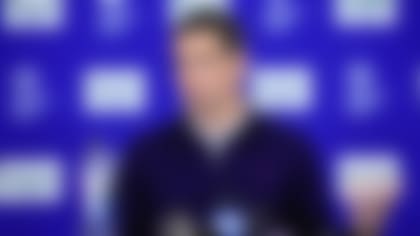Before draft prospects had the luxury of being evaluated by teams at one big event called the NFL Scouting Combine, they had to go through a few more hoops and travel a few more miles to have teams take a look at them.
Back in 1977, I was at the Cowboys' facility with general manager Tex Schramm and remember meeting a player named Nolan Cromwell from the University of Kansas. Cromwell had injured his knee during the 1976 season while at Kansas, and in the leadup to the draft, he was flying all around the country to meet with teams and show them the progress he'd made in rehabbing his knee. When Schramm and I saw him that day, Cromwell had about 15 X-ray envelopes tucked underneath his arm and had just come in on a redeye flight from Seattle. He had planned to visit at least a dozen teams to show them these X-rays.
I remember Schramm turning to me and saying, "There has to be a better way to do it than this."
It wasn't because of this incident, and we were not the ones to begin it, but the following year there were three scouting combines involving three organizations. In the years that followed the evaluation process became more and more of a collective event, and it escalated every year until the mid-1980s, when all the NFL teams gathered at one time for the combine as we know it today.
The combine now is a four-day affair, and this year more than 325 prospects are expected to gather in Indianapolis to show off their skills for pro teams.
I'm excited to see everyone at this event -- Jadeveon Clowney, Sammy Watkins, Johnny Manziel among them -- but here are eight guys who aren't necessarily household names that I'm interested in. All eight enter the combine with questions to answer and with something to prove:
Odell Beckham Jr., WR, LSU
Beckham Jr. won the Paul Hornung award as college football's most versatile player. Whoever drafts him will really be getting two players: a guy who can play receiver and a guy who can return kicks. I like him because I think that he can stretch the field with his great speed, but I want to get a closer look at what else he can do. I want to see his quickness, how he runs routes, and whether he comes out of the breaks really fast. I also want to see him in a receiving drill called the gauntlet, which tests whether a player can catch the ball in his hands cleanly and how quick his eyes are.
Blake Bortles, QB, UCF
I always worry a little about guys who burst onto the scene seemingly out of nowhere. Bortles is a one-year wonder who can prove a lot to me at the combine. He's had one good year, but it was an excellent year; he completed almost 70 percent of his passes and threw for 25 touchdowns and only nine interceptions. Right now he looks good on tape -- bringing his team from behind against Temple, beating Baylor in the Fiesta Bowl -- but now you want to see him outclass the other quarterbacks while competing against them at the combine. For example, when you see him in drills, he might not be the equal of Johnny Manziel moving around, but if teams are to consider Bortles that high in the draft, he has to be at least close to Manziel in athletic ability. These events are important because it will allow teams' knowledge of Bortles to increase -- right now, based on my knowledge of the two quarterbacks, I have Bortles as my No. 2 QB behind Manziel. It's possible that could change after the combine.
Aaron Donald, DT, Pittsburgh
Donald is relentless as a pass rusher and had 11 sacks this year, but he's short, at about 6-foot. I'm interested to see how long his arms are, and how he uses them in some of the drills. It's very, very hard when defensive linemen start playing against NFL guards that have long arms. If he has 30-inch arms, for example, that could be a problem for him at the pro level.
Mike Evans, WR, Texas A&M
Evans reminds me a little of Mike Williams, the receiver who was drafted by Detroit out of USC in 2005. What I really want to see from him at the combine is how he looks as a route runner. I want to know if he caught all these passes in college on mismatches where he just jumped up and caught the ball, or if he ran some routes to get open. It looks like he's got pretty good body control, and he obviously has a very strong build. He was very, very productive at Texas A&M, catching 151 passes in two years. But I've got a lot of questions about his route-running ability and wish he would've learned to do that better while in college.
Paul Richardson, WR, Colorado
Richardson came back from a 2012 knee injury and had an impressive year, posting 83 receptions for 1,343 yards and 10 TDs, but here's the thing about him: He's a very skinny receiver, at about 6-foot, 158 pounds. He has pretty good athleticism and speed, but he's just so small and so thin. There are a lot of things about him that I'm interested in finding out during the combine, including whether he catches the ball cleanly and the size of his hands.
Greg Robinson, OT, Auburn
Robinson is another guy who shot out of nowhere this year. He went from being a guard in high school to a left tackle at Auburn, and he's really only played two years at the position because he redshirted in 2011. Robinson looks like he's a good run blocker, but I want to watch his feet and quickness and his hand placement at the combine to see what kind of a pass blocker he can be in the NFL. He looks strong, but I want to see how strong in drills like the bench press.
Xavier Su'a-Filo, OL, UCLA
Su'a-Filo played left tackle as a true freshman at UCLA, which is a good sign, but I'm trying to see whether he's someone who can play guard, because I think that's his best position. I want to see him in drills that test his footwork, how strong he is and how well he moves around. I think he looks like a good run blocker, but I want to see how he does in pass protection.
Jordan Tripp, LB, Montana
A scout I trust told me he thought Tripp was one of the best prospects he's seen out of the Big Sky Conference. I started following Tripp this fall and got a chance to watch him at the Senior Bowl, and the thing I liked about him was that he wasn't in awe of his surroundings. A lot of times players from smaller conferences come to these events and look out of place. Tripp looked and acted like he belonged. Now he heads to the combine, and I'm interested to see how he stacks up with other top guys in various drills -- how quick his reactions are, how well he goes over the bags, whether he has good feet, etc. He has the size and speed that you want in a linebacker, and he's very athletic -- he can play with his hand on the ground and rush the passer, and he can also drop back and play in space.
Follow Gil Brandt on Twitter _@GilBrandt_.




